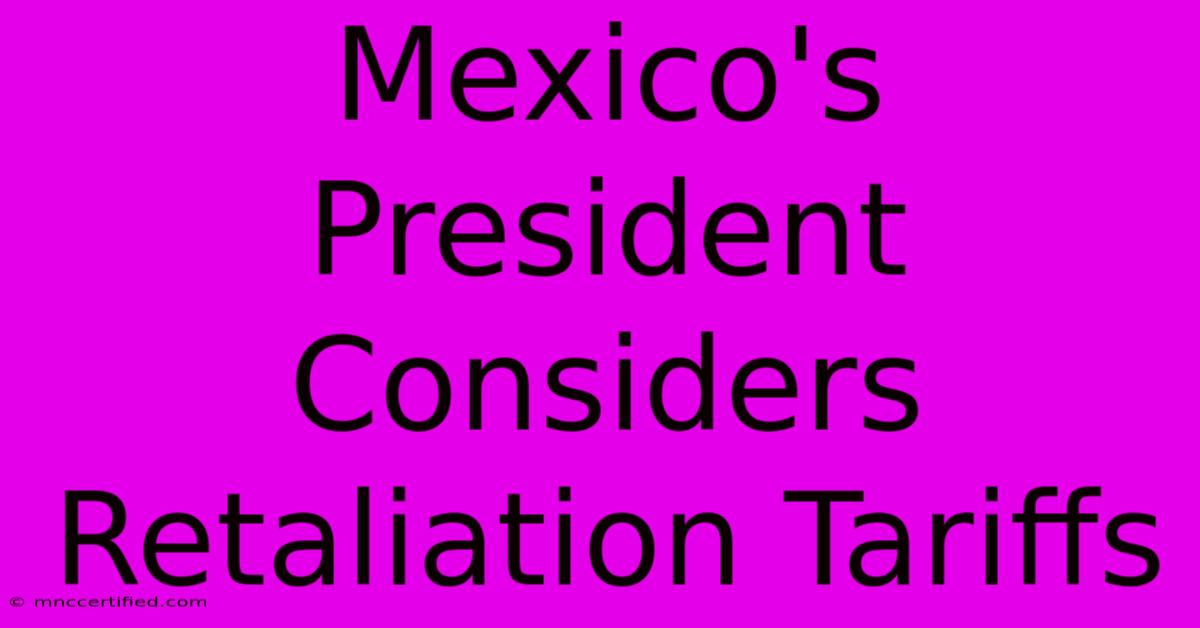Mexico's President Considers Retaliation Tariffs

Table of Contents
Mexico's President Considers Retaliation Tariffs: A Deep Dive into Potential Trade Conflicts
Mexico's President Andrés Manuel López Obrador (AMLO) has recently hinted at the possibility of imposing retaliatory tariffs on US goods. This action, though not yet confirmed, has sent ripples through the North American trade landscape and sparked intense debate about the future of the USMCA (United States-Mexico-Canada Agreement). This article will delve into the potential triggers, implications, and wider context surrounding AMLO's consideration of retaliatory tariffs.
Understanding the Potential Triggers
While AMLO hasn't explicitly stated the specific reasons for considering retaliatory tariffs, several underlying tensions could be fueling this contemplation:
1. Disputes over Energy Policies:
A major point of contention revolves around Mexico's energy policies, particularly those prioritizing state-owned energy companies over private, often US-based, firms. The US government has voiced concerns about these policies, alleging they violate the USMCA's stipulations regarding fair competition and investor protection. This could be a significant catalyst for AMLO's threat.
2. Immigration and Border Security:
The ongoing challenges related to immigration and border security between the US and Mexico remain a persistent source of friction. While not directly linked to trade, AMLO's frustration with US immigration policies could indirectly influence his decisions regarding trade relations. He may view retaliatory tariffs as a means of leverage in broader diplomatic negotiations.
3. Concerns over the USMCA's Implementation:
Differences in interpretation and enforcement of the USMCA itself can lead to disagreements. Both countries might have varying understandings of specific clauses, leading to trade disputes that escalate to retaliatory measures. A lack of effective dispute resolution mechanisms within the USMCA could further exacerbate this issue.
Potential Implications of Retaliatory Tariffs
The imposition of retaliatory tariffs by Mexico could have significant consequences for both countries, as well as Canada, given their integrated North American supply chains. These implications include:
1. Increased Prices for Consumers:
Retaliatory tariffs would likely lead to higher prices for consumers in both the US and Mexico, affecting a wide range of goods. This could negatively impact consumer spending and economic growth.
2. Disruption of Supply Chains:
The intricate supply chains connecting the US and Mexico would be severely disrupted, leading to delays, shortages, and potentially higher production costs for businesses.
3. Damage to Trade Relationships:
Retaliatory tariffs would severely damage the already strained trade relationship between the US and Mexico. Repairing this damage would require significant diplomatic effort and could take considerable time.
4. Political Fallout:
The trade dispute could have significant political ramifications, potentially affecting bilateral relations beyond trade and influencing other areas of cooperation.
Navigating the Path Forward: Diplomacy and Negotiation
The best way forward involves prioritizing diplomacy and negotiation. Both the US and Mexican governments need to engage in constructive dialogue to address underlying concerns and find mutually agreeable solutions. Open communication, a commitment to respecting the USMCA, and a focus on resolving disputes through established mechanisms are crucial. Ignoring these tensions risks further escalation, and potentially, a trade war.
Keywords: Mexico, retaliatory tariffs, AMLO, USMCA, trade war, US-Mexico relations, energy policy, immigration, supply chains, trade disputes, economic impact, diplomatic negotiations.
Off-Page SEO Considerations
To further boost this article's ranking, consider these off-page SEO strategies:
- Backlinks: Secure high-quality backlinks from reputable news sources, business publications, and relevant websites covering international trade and Mexican politics.
- Social Media Promotion: Share the article across relevant social media platforms to increase visibility and drive traffic.
- Guest Posting: Contribute articles on related topics to other authoritative blogs in the field of international trade and economics.
- Industry Participation: Engage in relevant online forums and communities discussing Mexico-US relations to establish thought leadership and increase brand visibility.
By implementing these on-page and off-page SEO strategies, you significantly improve the chances of this article ranking highly on Google search results pages for relevant keywords, enhancing its reach and impact. Remember to consistently update the content to reflect new developments in the story.

Thank you for visiting our website wich cover about Mexico's President Considers Retaliation Tariffs. We hope the information provided has been useful to you. Feel free to contact us if you have any questions or need further assistance. See you next time and dont miss to bookmark.
Featured Posts
-
Whats Next For The Vanderpump Rules Cast
Nov 27, 2024
-
Barcelona Global Elon Mens Xc
Nov 27, 2024
-
Auto Insurance Elkhart Indiana
Nov 27, 2024
-
Team News Man City Vs Feyenoord
Nov 27, 2024
-
Morrisons Shortages Three Aisles Empty
Nov 27, 2024